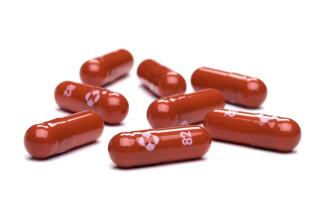FDA Approves Further Clinical Tests of AIDS Drug Ribavirin by Health Institutes
- Share via
The National Institutes of Health said Wednesday it has received approval this week from the Food and Drug Administration to start new clinical tests of ribavirin, a drug developed by ICN Pharmaceuticals of Costa Mesa to fight AIDS.
“There is a lot of pressure to study it (ribavirin), and there is a lot of scientific interest,” said Dr. Dale Spriggs, deputy chief of the AIDS program treatment branch of the National Institute of Allergy and Infectious Diseases, which is part of the National Institutes of Health.
Spriggs said the first phase of testing will involve about 150 people with acquired immune deficiency syndrome or pre-AIDSs conditions. He said program officials hope the testing will begin by the end of December at medical centers in Boston, San Francisco, New York and New Orleans.
A Smaller Study
The institutes-sponsored tests follow a report on a smaller clinical study of ribavirin published last month in the Annals of Internal Medicine, indicating that the drug can sometimes suppress the AIDS virus.
Dr. Clyde S. Crumpacker, associate professor of medicine at Harvard Medical School and author of the published study, also heads the group of scientists who designed the National Institutes of Health study.
Crumpacker said Wednesday that the National Institutes of Health was impressed by the “beneficial effects” shown in the study of 15 AIDS and pre-AIDS patients conducted from July, 1985, to July, 1987, under a grant from the Massachusetts Department of Public Health.
The published study indicated that while ribavirin is not a cure for AIDS, it may be able to prolong life, Crumpacker said.
Study Too Limited
Moreover, he said, ribavirin may be tolerated by AIDS and pre-AIDS patients who have adverse side effects, such as bone marrow toxicity, from AZT, the only anti-AIDS drug to be approved so far by the Food and Drug Administration.
He stressed, however, that the published study was too limited in scope to render a final verdict on ribavirin.
Crumpacker said he is optimistic that ribavirin “does not make patients worse” and that “fragile patients can tolerate it.”
But, he said: “There is a need to show whether it will really be effective as a treatment. It does need to be studied further.”
The results of previous clinical tests conducted by the manufacturer have been questioned by the FDA, which early this year rejected two separate applications by ICN to allow the use of ribavirin under a special FDA designation intended to provide promising life-saving drugs to patients while they are still being assessed for regular commercial distribution.
Because of the FDA’s concerns about the safety of ribavirin, the agency last April placed what officials called “a de facto clinical hold” on further human tests of the drug. After receiving more data, however, the FDA lifted the testing restriction in October.
Get Things Rolling
“We can provide a service in just trying to get things rolling,” Spriggs said of the new series of tests by the National Institutes of Health.
He said it may be advantageous for the federal agency to conduct the tests. “One might argue it would be more objective,” he said.
Spriggs said the institutes had been talking with ICN “off and on for about a year” about the possibility of conducting tests of ribavirin.
“At first, the company didn’t elect to participate in our studies,” he said, because ICN was involved in its own testing. But now, he said, there is full cooperation from ICN, which is supplying the drug.
ICN spokesman Jack Sholl said ICN welcomes the new testing. “Basically, we believe that the drug should be further tested against pre-AIDS conditions, and we believe this new study is a positive step forward recognizing that the final determination for safety and efficacy that would lead to marketing approval of ribavirin rests with the Food and Drug Administration,” Sholl said.
Spriggs said the first objective of the testing will be to determine the maximum dosage of the drug that can be administered without causing toxic effects. After that, he said, the tests will be aimed at determining the most effective dosage.
Two-Part Testing
The testing will be divided in two parts, Spriggs said. Four Boston hospitals affiliated with the medical schools at Harvard, New York University and UC San Francisco will test ribavirin on about 100 people with AIDS and AIDS-related complex.
In addition, he said, Tulane University Medical School will test the drug on about 50 people who have the AIDS virus in their bloodstream but don’t show symptoms of the disease.
Spriggs said he doesn’t expect to have any difficulty finding people who will participate in the ribavirin testing because there is “so much interest in this drug.” He said that although ribavirin cannot be legally marketed in the United States, many AIDS patients obtain the drug, sometimes by buying it in Mexico.
Spriggs said the National Institutes of Health has assembled a national network of 36 medical facilities that are conducting clinical tests of 20 drugs besides ribavirin to determine whether they are effective in fighting AIDS and infections associated with it. The agency receives $80 million a year in federal funding for the project, he added.
ICN’s Sholl said other tests of ribavirin’s potential role as an AIDS treatment are in progress or about to begin.
In addition, he said, ICN is sponsoring a test of higher than previously tested dosages of ribavirin on 48 patients with AIDS-related complex and lymphadenopathy, another pre-AIDS condition, at New York Hospital-Cornell Medical Center. And the New Jersey School of Medicine and Dentistry in Newark is studying the effectiveness of ribavirin on children with AIDS.
Sholl said that ICN plans to start an international program for testing of ribavirin on approximately 500 patients with AIDS-related conditions in Canada, the United Kingdom and Spain.





